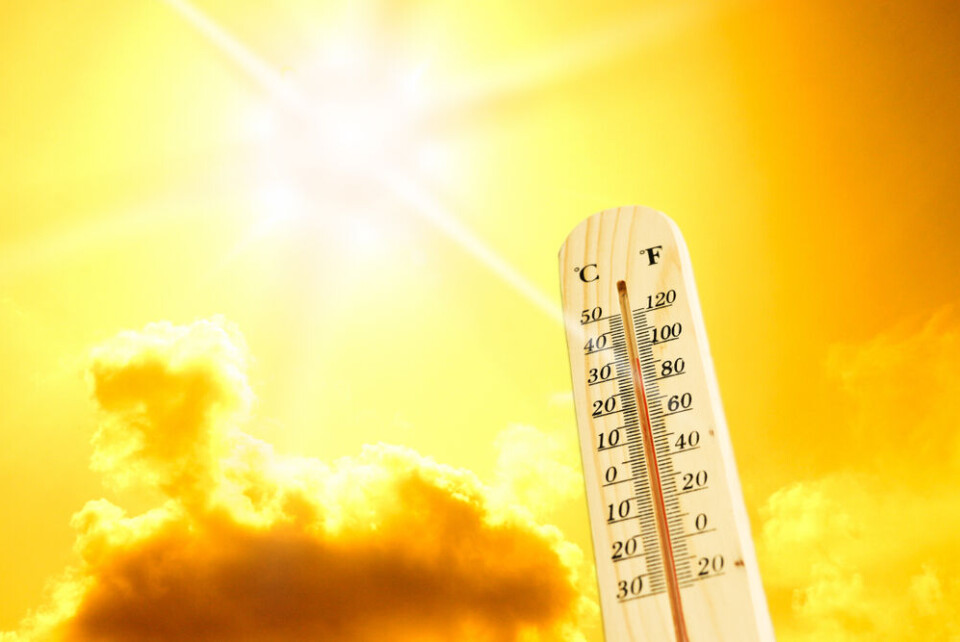-
Rail passenger in France fined €200 for playing music aloud on phone
On-the-spot fine was increased after passenger initially refused to pay
-
House cracking threat spreads to new areas in France, putting 12 million properties at risk
Map from environment ministry shows more than half of country at risk
-
Hospital fees set to increase in France: how will patients be affected?
Plans to save €400 million from social security spending targets several flat fees
14 departments now on red heatwave alert: when will the heat peak?
The exceptional hot weather now covers most of the country with the south-west and west particularly affected

Two more departments have been placed on a heatwave red alert - the highest level, bringing the total to 14. They are all in the south-west and west of the country.
Another 56 departments are on orange alert.
It means that 68 of France’s 96 metropolitan departments are on one of France’s three heatwave alerts. A further 19 departments are on yellow alert, which is less severe but people should still take care.
France’s health minister Brigitte Bourguignon has said that 10 million text messages have been sent out to warn people of the dangers of the heatwave.
🔴 14 dpts en #vigilanceRouge
— VigiMétéoFrance (@VigiMeteoFrance) June 17, 2022
🔶 56 dpts en #vigilanceOrange
Restez informés sur https://t.co/rJ24zzmmy4 pic.twitter.com/s0HFHrKHD5
Departments on red alert:
Pyrénées-Atlantiques, Hautes-Pyrénées, Charente, Charente-Maritime, Haute-Garonne, Gers, Gironde, Landes, Lot-et-Garonne, Deux-Sèvres, Tarn, Tarn-et-Garonne, Vendée, Vienne.
Departments on orange alert:
Allier, Ardèche, Ardennes, Ariège, Aube, Aude, 'Aveyron, Cantal, Cher, Corrèze, Côte-d'Or, Creuse, Dordogne, Doubs, Drôme, Eure-et-Loir, Ille-et-Vilaine, Indre, Indre-et-Loire, Isère, Jura, Loir-et-Cher, Loire, Haute-Loire, Loire-Atlantique, Loiret, Lot, Maine-et-Loire, Marne, Haute-Marne, Mayenne, Meurthe-et-Moselle, Meuse, Morbihan, Moselle, Nièvre, Orne, Puy-de-Dôme, Bas-Rhin, Haut-Rhin, Rhône, Haute-Saône, Saône-et-Loire, Sarthe, Paris, Seine-et-Marne, Yvelines, Haute-Vienne, Vosges, Yonne, Territoire de Belfort, Essonne, Hauts-de-Seine, Seine-Saint-Denis, Val-de-Marne and Val-d'Oise
Météo-France has warned that temperatures will continue to rise tomorrow (June 18) as the hot air spreads further north and east. It has described the heatwave as “exceptional in its intensity and earliness”.
Temperatures in the Languedoc-Roussillon region are, though, expected to drop.
Demain la vague de chaleur exceptionnelle par son intensité et sa précocité se poursuit et s’accentue à mesure que la masse d'air extrêmement chaud va progresser plus au nord et plus à l’est. Températures maximales en baisse en revanche entre Languedoc et Roussillon. pic.twitter.com/H3h2gAqOnw
— VigiMétéoFrance (@VigiMeteoFrance) June 17, 2022
The current heatwave is expected to peak on Saturday and temperatures are set to drop on Sunday after a storm over the west coast.
What do red and orange alerts mean?
The alert system is part of France’s annual ‘plan canicule’, a system set up to manage heatwaves.
Read more: Explainer: France’s ‘heatwave plan’ and how it may affect residents
Red alert means that there is an extreme heatwave and that people should be extremely careful.
This level is announced only during exceptional, very intense and long-lasting heatwaves.
During a red-alert heatwave, there are often droughts, issues with the supply of drinking water, high demand for hospitals and / or funeral homes become overrun, there are power cuts and forest fires, working hours or practices are adjusted, etc.
The government will set up an inter-ministerial crisis group to help manage the heatwave.
Special provisions will be made to take care of vulnerable people, including homeless people and those in retirement homes.
Orange alert
Once this level is reached, the department's local prefect takes all necessary measures to address the heatwave, in accordance with the Plan de Gestion d’une Canicule Départemental (PGCD). The following steps are usually taken:
- Communication is increased to make people aware of the dangers of heatwaves and what they can do
- In retirement homes, a “plan bleu” can be announced, which involves greater mobilisation of staff and resources to counter specific threats generally, for example Covid, an outbreak of flu, as well as heatwaves / other
- Ambulance and nursing services are mobilised
- Mairies establish lists of people vulnerable to heatwaves and can offer support
- Additional support is given to homeless people
Starting from June 1 every year, all French departments are automatically placed on green alert for heatwaves. This means that there are no particular concerns.
From this point, national and local relevant authorities start to ensure that they are prepared for heatwaves. Simultaneously, Météo-France begins its surveillance of heatwaves and a national helpline to provide information is opened.
The number is 0800 06 66 66 and is open Monday to Saturday, 09:00 to 21:00. It is free to call from landlines while your usual mobile costs apply.
Consequences of the heatwave
France's ministry of education stated that school pupils in primary or collège level do not need to go to school in the 12 departments where the red alert has been declared.
The head of Paris police has asked drivers to reduce their speed by 10km/h due to heavy pollution, linked to the heatwave.
Drivers in Bas-Rhin and Haut-Rhin have been asked to reduce their speed by 20km/h for a similar reason.
The prefect of Gironde announced on Thursday (June 16) that all outdoor public protests would temporarily be banned starting from 14:00 today (June 17) due to the heatwave. Six other departments in Nouvelle-Aquitaine that are on red alert have imposed a similar rule.
The second stage of the Route d'Occitanie cycle race in Tarn has been postponed due to the heatwave.
In Bordeaux, water sprinklers will be installed in city squares to cool them down.
Related stories
12 French departments on ‘red alert’ for heatwaves, PM announces
Temperatures reach 40C in France but set to get even hotter
How hot will France’s heatwave be and how long will it last?
























